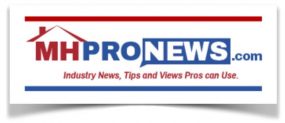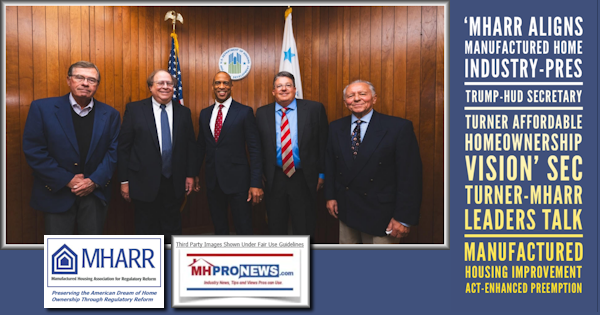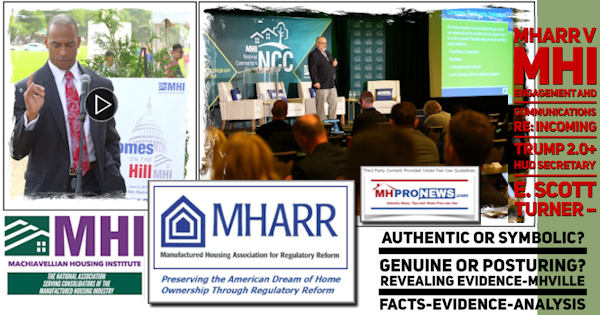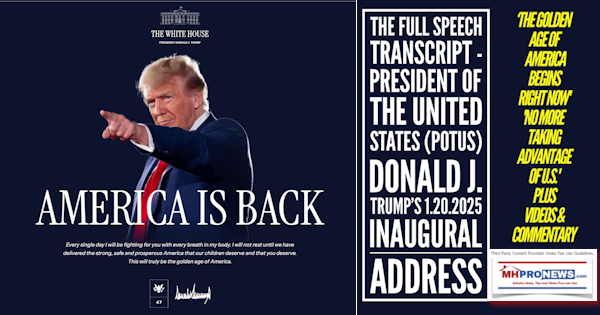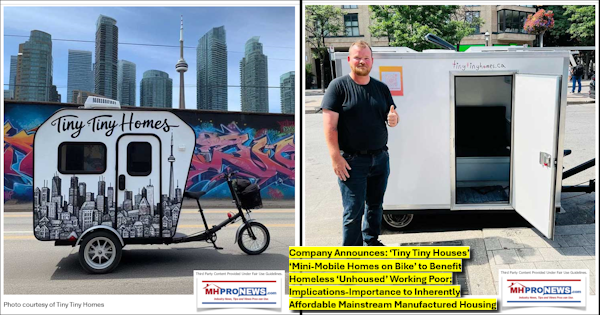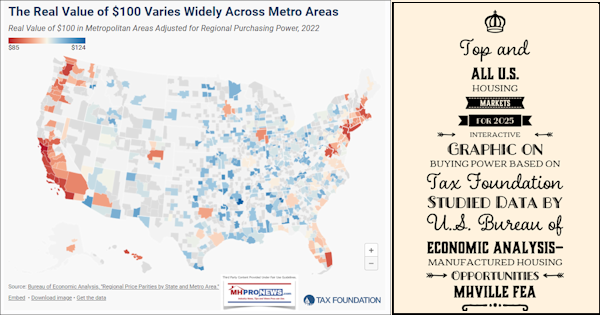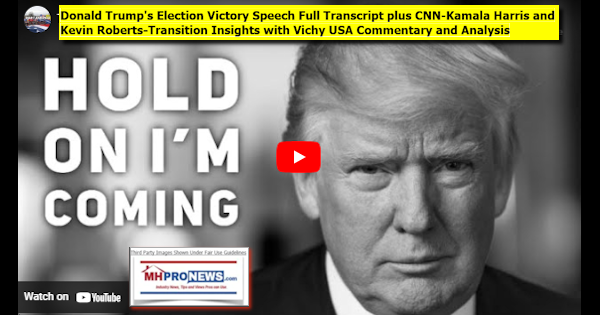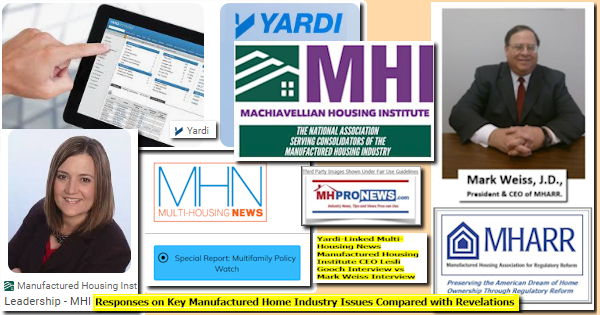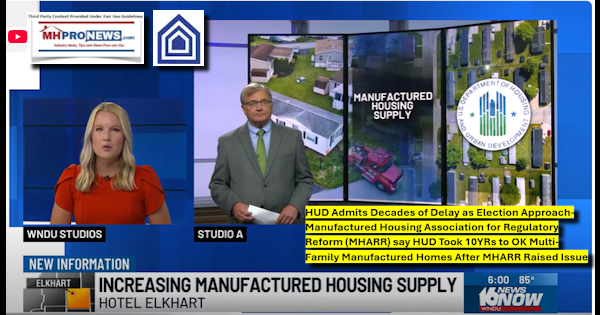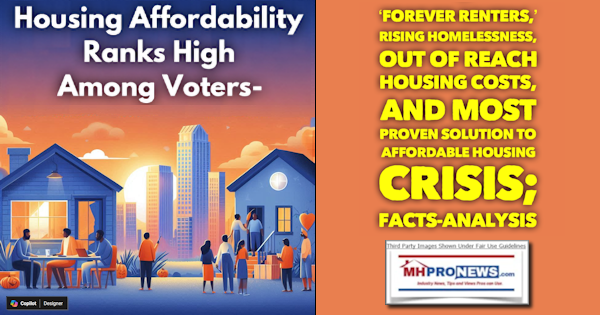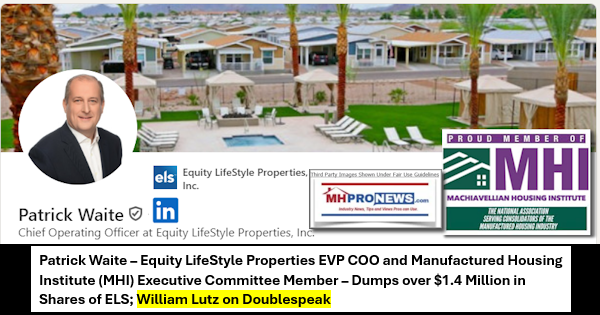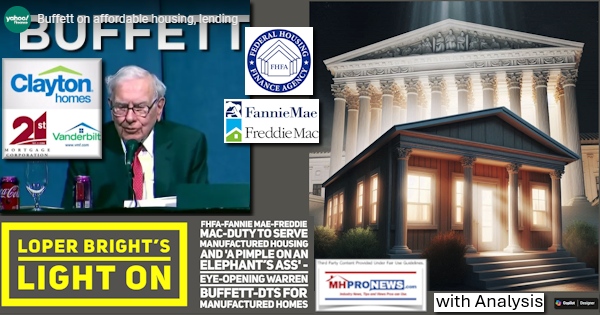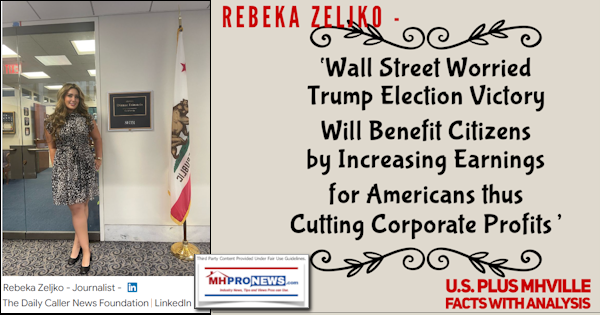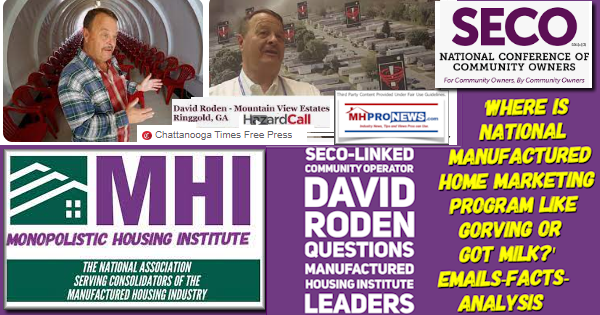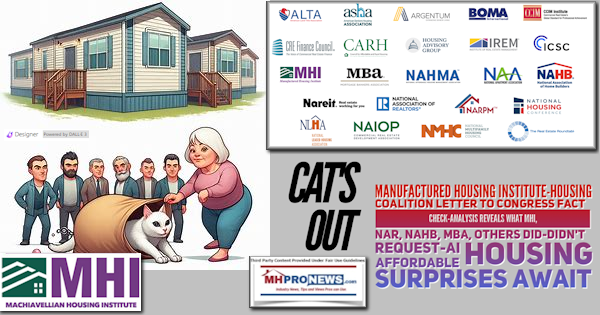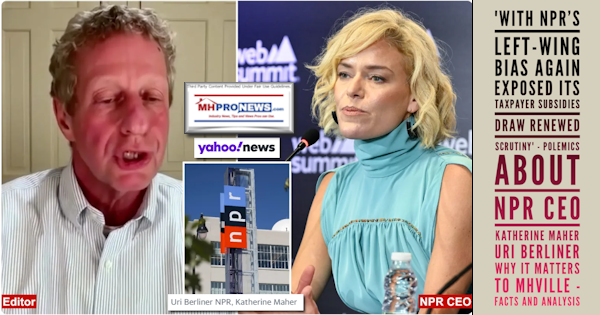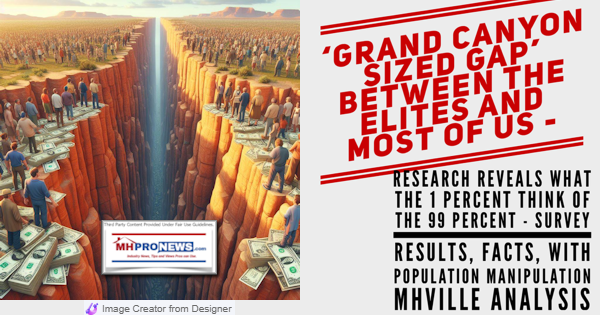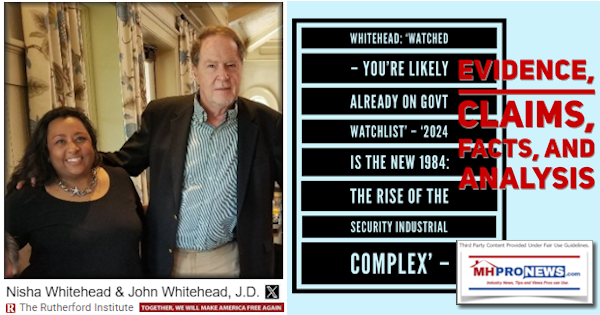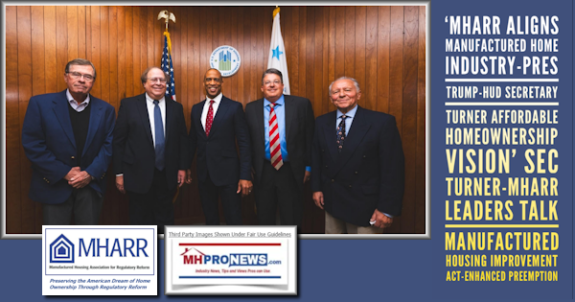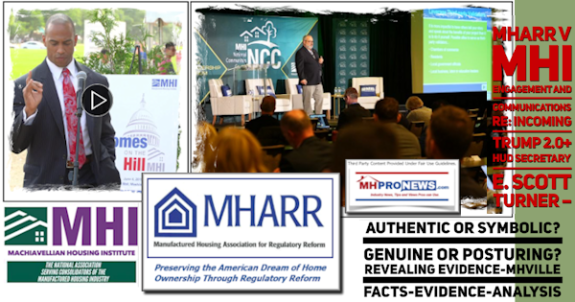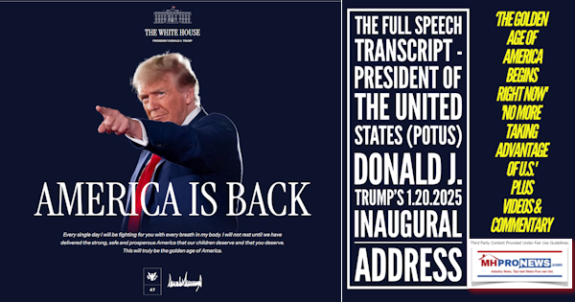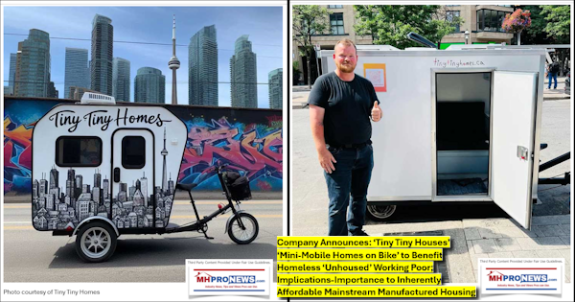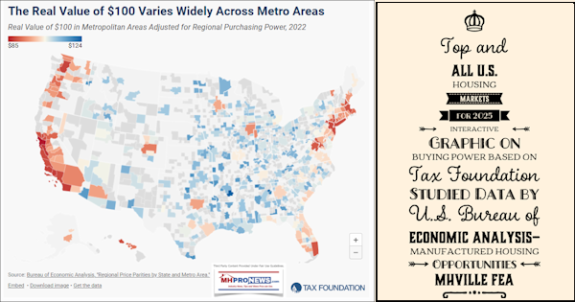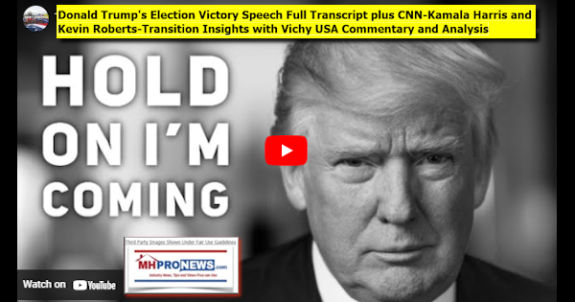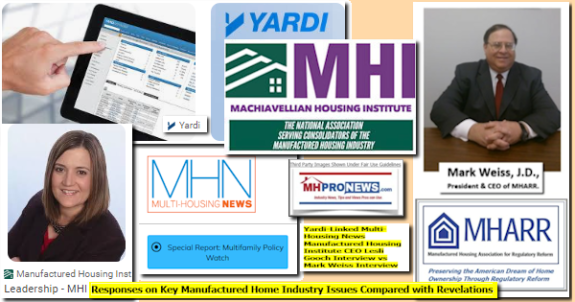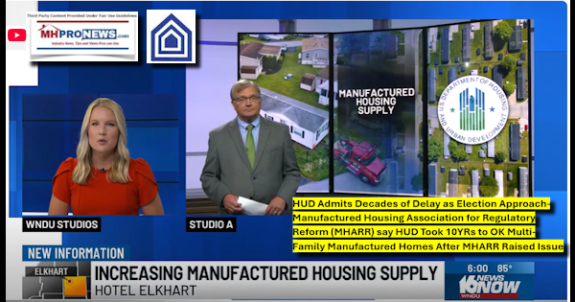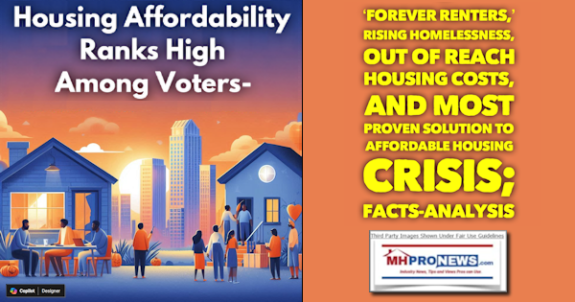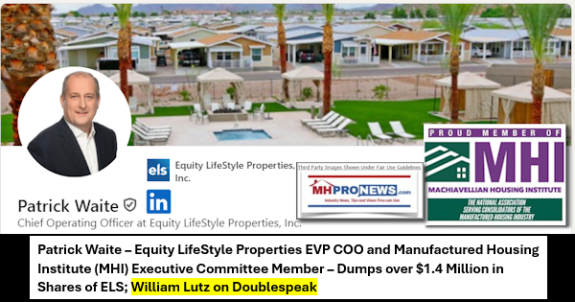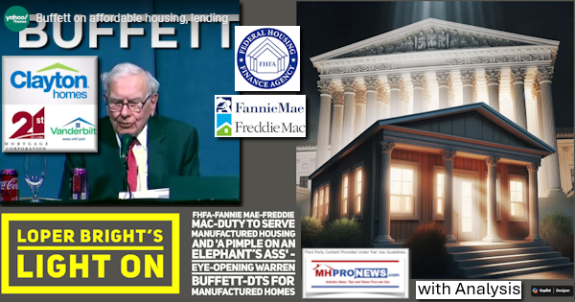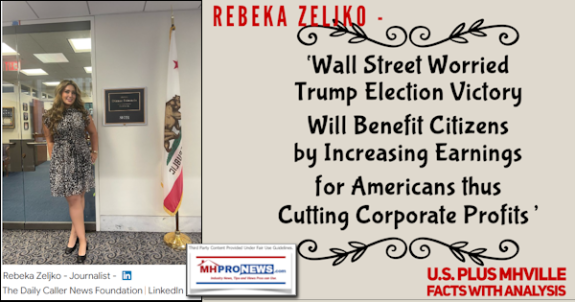It would be nice if we could share a manufactured housing news headline at MHMSM.com that read like this:
MHI and MHARR Cooperate on Dodd-Frank with their Capitol Hill Resources
We can’t give you that headline, which is the motivation for this column today. But we do need a truce between the Manufactured Housing Institute (MHI) and Manufactured Housing Association for Regulatory Reform (MHARR) on key issues, with Dodd-Frank being one of them.
Let me be clear from the outset: both national associations would state privately and publicly, that they want to see a modification of Dodd-Frank. But one is working at it, and another is busy with other matters.
Let me also be clear, this is not a call for unity between the two organizations. Their leaders would say each exists for its own reasons and constituencies.
So can their be cooperation between the two national associations? Should there be?
Industry insiders tell us that implementation of Dodd-Frank without amendments will cost the HUD Code manufactured housing Industry another 20,000 annual new home shipments. How many more factories would close as a result of the the loss of 20,000 shipments?
Beyond the loss of 20,000 new HUD Code manufactured home shipments – and 20,000 manufacturing jobs with them – potentially tens of thousands of pre-owned home sales would also be lost. Why? Because an unamended Dodd-Frank will make lending on them unprofitable.
So how many more retailers, communities, finance, insurance and other suppliers will that projected sales drop impact? How many millions of manufactured home owners will suffer a loss of value as a result of Dodd-Frank?
This is the backdrop to the issue: can MHI and MHARR bridge the gap on select issues and work together for the good of millions of manufactured home owners and the Industry at large?
We will look at some recent history to understand the challenges, and also to encourage the pursuit of such an effort.
I. Reforming Dodd-Frank: a challenge in DC today
It is no secret that the Manufactured Housing Institute (MHI) is fighting an up Capitol Hill battle to get a modification for Dodd-Frank accomplished before rule making goes into effect. With the House held by Republicans, and the Senate and White House held by Democrats, getting anything done on a bi-partisan basis this year is not easy. All the more reason for both MHARR and MHI to work together.
The Consumer Finance Protection Bureau (CFPB) will officially open on July 21st, 2011. But no one knows what date the rules under Dodd-Frank that will impact our industry will take effect. Some hope that process will take 18-30 months. But what if rule making gets published and implemented more rapidly? Can we afford to see a new drop in shipment and sales levels?
Clearly not. That is why the Industry’s best possible effort needs to begin asap and be maintained until the needed changes become a reality.
This is why a truce between MHI and MHARR could be very useful in Dodd-Frank, or other issue, such as the MHCC. Each national association has much to protect and gain from such an effort.
Such an effort could save jobs, save businesses and protect manufactured home owners in the process from the unintended consequences of Dodd-Frank.
II. Recent history on MHI and MHARR relations. Facts and Challenges
The following outline are the perceptions of a number of industry voices who shared their insights as noted below. They are part of the ‘news and tips’ we get that can keep our readers better informed. These insights come from industry members, government officials, associations and others who are in the know.
Regrettably such talk is rarely shared in public forums. Let’s give voice to those perceptions in the bullet points below. That will be followed by an analysis.
Some of these items have not been published before, some are better known. Let’s begin with no particular order of importance:
MHARR on MHI:
- Danny Ghorbani and MHARR have not made it a secret that their “production” and “post-production” ideal for national associations is a way to split MHI up. If that occurred, that would effectively kill the MHI that we know today.
- Under Danny’s concept, MH Communities and Retailers (presumably finance, insurance, etc.) would have their own new ‘post-production’ national association. Then manufacturers and component suppliers would have their ‘production’ national association.
- MHARR often blasts MHI for this or that perceived failure via their news releases and opinion columns. That goes back to his arguments for the break up of MHI into post-production and other producers then could join MHI.
- MHARR leaders sincerely believe that without their efforts in the 80s and since, HUD Code housing would have vanished long ago.
MHI members on MHI and MHARR:
- There are those who support Danny’s idea of a remodeling of MHI – at least in theory – among MHI’s own members. Doug Gorman has publicly said (paraphrasing to save time) ‘retailers would be better off with their own association, but we have MHI and we have to make the best of it.’ If Doug were any other retailer, maybe that statement would not be such a big deal. But he is the most award winning retailer that MHI has as a member.
- Doug Gorman is also a voice that says, ‘The Industry needs Danny Ghorbani.’ Doug has served for a long time on the Manufactured Housing Consensus Committee (MHCC). So Doug is very knowledgeable about issues from manufacturing, regulatory and retail perspectives. He is a voice that public officials respect, who generously donates time for state and national efforts. Doug has the respect of many of his Industry peers.
- George Allen has essentially been a voice in the MHI ranks that questions MHARR, or of late, has proposed in writing a means of doing MHARR in via MHI manufacturers buying out MHARR manufacturers.
- Some state execs or MHCC members see periodic value to Danny Ghorbani’s insights on production and HUD Code related issues. But not many will publicly agree with Danny’s method or approach of dealing with HUD or MHI.
- State execs are not always comfortable with the level of progress made by MHI on key issues, be it Dodd-Frank, SAFE, etc. Some are down-right worried for the Industry’s future. But they at times feel similarly to Doug Gorman’s comments, they see MHI as the only game in town for them.
Rumblings about MHARR from MHI and MHARR:
- Even among MHARR members, there are those who privately have their questions and concerns about Danny Ghorbani’s often strongly worded emailed messages.
- Some appreciate the more factual and toned down approach that occasionally comes from MHARR, even if the realities or thoughts behind the messages are unchanged.
- Thayer Long has generally been milder in his approach towards MHARR than MHARR towards MHI. But Thayer has at times responded. Such was the case recently, when Thayer sounded off exclusively with MHMSM.com after the IBISWorld report, or on the HUD/fire-sprinkler standards topic, etc.
- At MHI’s annual meeting last year, one leader publicly described Danny Ghorbani as the ‘elephant in the room’ who has to be dealt with.
Recent efforts for unity on key issues in DC:
- Partially as a response to such division at the national level, the Arkansas Manufactured Housing Association’s Executive Director, J. D. Harper, attempted last year an initiative that hoped to bring a new lobbying voice to Washington DC, to be given birth from the state associations level. The concept was designed to bridge the gap on issues like SAFE and Dodd-Frank.
- There was a private meeting last summer between 3 CEOs for MHARR manufacturers, and 3 CEOs of MHI manufacturers. There was early hope that this would result in some sort of mutual efforts on topics such as Dodd-Frank. But for a variety of reasons, those secret talks fell apart.
- It should be noted that the goal of those secret MHI-MHARR talks was not ‘unity’ per se, but rather an attempt to bridge the gap on key issues of mutual concern, such as Dodd-Frank.
Elected officials and Regulators:
- It should also be noted that regulatory personalities such as Bill Matchneer at HUD (who along with others who are with the HUD Code program will soon be at CFPB), have stated to MHMSM.com in writing that working with MHI is easier than working with MHARR.
- Off the record comments from HUD officials and congressional elected officials often pose the concern: who do we listen to between these two national organizations? Are these groups as professional in their lobbying approach as they could be?
- Imagine for a few moments being a HUD official; or a congressmen or senator whose staff says MHARR wants one thing, MHI another. How can that help our Industry at such challenging times as these?
A new association?
- There was a brief effort last year that MHMSM.com reported on that was for a time supported by George Allen and others. This was the so-called MHIdea promoted by retailer Dick Moore and his associate Bob Crawford. That initiative rapidly vanished, although they maintain a website and a Linkedin page.
- One of the concerns among state associations regarding JD Harper’s concept was the fear that what would arise would be a ‘third’ national voice. JD himself stated such was NOT his goal for the regulatory lobbying effort. As a footnote, that effort begun by JD was co-opted by MHI who hired the lobbyist tasked with working on regulatory issues (such as the SAFE Act or Dodd-Frank).
Who has done what? What are the styles and results?
- General comments about the two styles among industry pros runs like this: Thayer is often seen as having more of a consensus building style, but some wonder if he gives too much in the process. Thayer and MHI put up their ‘score card’ annually. He says other associations should provide an annual ‘score card’ on what was accomplished every year too.
- Danny Ghorbani’s style is seen as more of a letter of the law as I see it and you (gov’t bureaucrats) better jump in line. Needless to say, this does not sit well with regulators, but it does play better with others. Danny and his associates would say, they lay out the facts and want those facts and the law respected. Why compromise on the law as it was written and intended?
- MHARR blames MHI for failure to advance in DC.
- MHI via Thayer Long has publicly questioned what Danny has actually accomplished in recent years, beyond finger pointing and blaming MHI.
- There is no solid unity on issues such as the MHCC and HUD’s moves to ‘neuter’ the MHCC. Views on issues such as requirements for fire sprinklers vary as well.
- It should be noted that both groups believe in the need to protect chattel financing. Danny states he does support MHI’s efforts on Dodd-Frank.
- State execs as a rule line up behind MHI, which is understandable, as they have a real voice in that association.
- There has not been so much as a lunch between Danny and Thayer for some time, although one of those two parties would likely agree to do lunch in a minute.
- George Allen in his published musings on the topic tags MHARR for lack of engagement on community or other ‘post-production’ related issues. Danny’s reply to that is that they get not one penny from communities or retailers, etc. Nor does MHARR want it, Danny says. Danny says they only reason they have engaged in the post-production issue of finance at all is that MHARR thinks it has been vitally necessary to the survival of the industry.
- There are numerous voices that sees the value to MHI, to meetings like the MHI Congress, legislative sessions, etc. that are there to inform, education, inspire and hopefully encourage grass roots support.
- Certainly, MHI members vote with their feet and wallets, just as MHARR members do.
The above is not comprehensive.
For example, in the above, I’ve not gotten into conspiracy theories that George Allen has periodically raised. I’m just outlining facts known to me personally or from others in various in Industry circles.
Some observations:
III. Brief Analysis:
1. Neither MHI nor MHARR wants to be done in. Talk of destroying the other association by whatever means can only cause each side to be less willing to work with the other.
2. Free entertainment? While this is lack of cooperation between MHI and MHARR is ‘entertaining’ in a fashion, this arguably does neither group nor their members any good. This entertainment isn’t free at all, it is arguably costly to us all.
3. A new national association. The idea of trying to create a new national association in these challenged times, or re-align the existing ones, is problematic at best. Time and money are key challenges, even if there were widespread support for the concept. I’m reminded that there are individuals in this Industry who could personally fund such a new organization with their pocket change. However, starting a new national association is not the same as such a hypothetical group being instantly effective in lobbying efforts.
4. Finger pointing does no one any good. Who did what to whom first, or who failed on what, when and how is only useful to learn from. Finger pointing doesn’t change the reality of where our Industry stands today.
5. I recall George Allen’s idea last year of having an MHI and MHARR ‘debate’ at his International Networking Round Table. That debate did not take place. It is an interesting idea. It could bring quite a crowd to say a webinar, for people to hear the issues ‘debated’ between the two organizations. But I’m not sure it would help bring the resolution that people would want or we as an Industry certainly need.
What baffles me are some logical ways that each side could see its way clear to helping the other. These are two no-brainers:
A. Where is the effective difference between MHARR working on Capitol Hill for reforms that would allow the GSEs or FHA to make more chattel loans, and for MHARR working with MHI on reforming Dodd-Frank? Aren’t both finance related? Wouldn’t protecting current financing and sales be as important have the same logic as being involved in finance?
B. Doesn’t MHI’s leadership see how it could support MHARR on matters that impact their constituents? Can’t MHARR provide MHI with a laundry list of its hottest topics? Can’t MHI say, MHARR please help us on the SAFE Act and Dodd-Frank, etc.?
Key MHARR and MHI Leaders should meet.
What should take place is that the chairmen and key members of MHARR and MHI would meet in private again and make peace. Let them carve out the areas they can agree to support each others on. Then, let them agree on which topics not to step on each other’s toes.
Then let that MHARR-MHI committee leaders give the marching orders to their respective association executives.
Needless to say, there has to be give and take for such a ‘coming together’ on key topics to occur.
Can it be done? Absolutely. This is no day dream, because it HAS happened before!
This type of agreement was achieved during the run up to the passage of the Manufactured Housing Improvement Act of 2000. The need is no less great today. Indeed arguably, the need is greater.
What is certain is that just as no person is perfect, the same is true for an organization or association. If one said claims perfection, they lose credibility instantly.
Let’s close with the same point we opened with.
It would be nice if we could share a manufactured housing news headline with you here at MHMSM.com that read like this:
MHI and MHARR Cooperate on Dodd-Frank with their Capitol Hill Resources.
Let me encourage you to contact the independent MHARR manufacturers you work with or MHARR’s Chairman, John Bostick of Sunshine Homes.
Then let me encourage you to contact Joe Stegmayer at Cavco, who is MHI’s Chairman. Kevin Clayton at Clayton Homes and Woody Bell from Palm Harbor where also part of the meeting last summer with the 3 MHARR CEOs.
Certainly, you can address Danny Ghorbani or Thayer Long directly as well in support of the truce and collaboration idea.
If our industry can pull together a truce on the national level on enough unity on key topics, the odds of averting a further melt-down over Dodd-Frank’s regulations goes up. Other issues of importance, could also be more successfully addressed.
All that can start with a simple email or phone call to your association and/or your representatives to encourage a much needed ‘detente’ between the two national trade organizations.
Your posted comments, calls or emails on this or other topics are welcome. Thank you for all of those who provided tips and insights that made this Masthead blog post possible. # #
